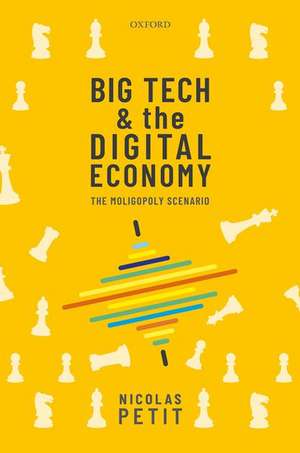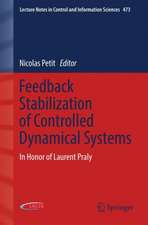Big Tech and the Digital Economy: The Moligopoly Scenario
Autor Nicolas Petiten Limba Engleză Hardback – 8 oct 2020
Preț: 614.82 lei
Preț vechi: 825.69 lei
-26% Nou
Puncte Express: 922
Preț estimativ în valută:
117.64€ • 123.18$ • 97.58£
117.64€ • 123.18$ • 97.58£
Carte tipărită la comandă
Livrare economică 31 martie-05 aprilie
Preluare comenzi: 021 569.72.76
Specificații
ISBN-13: 9780198837701
ISBN-10: 0198837704
Pagini: 320
Dimensiuni: 163 x 243 x 24 mm
Greutate: 0.62 kg
Ediția:1
Editura: OUP OXFORD
Colecția OUP Oxford
Locul publicării:Oxford, United Kingdom
ISBN-10: 0198837704
Pagini: 320
Dimensiuni: 163 x 243 x 24 mm
Greutate: 0.62 kg
Ediția:1
Editura: OUP OXFORD
Colecția OUP Oxford
Locul publicării:Oxford, United Kingdom
Recenzii
Petit makes innovative use of securities filings and other business documents to substantiate his hypothesis, and in the process paints a vivid and gripping picture of the different cultures and business models of the six Big Tech companies he focuses on.
With his 'moligopoly hypothesis' Nicolas Petit has set forth a fresh and insightful perspective on the tech giants that will challenge the preconceptions of the firms' populist critics, their Chicago School defenders, and competition law officials as well.
Petit documents intense levels of broad based competition faced (and delivered) by big tech firms and he tries to reconcile this with the moniker of monopoly that some antitrust scholar and regulators ('Neostructuralists') attach to Facebook, Apple, Amazon, Netflix, and Google. He finds the confusion stems less from ideology than from analytical framework used. Petit offers new and refreshing ways to think about competition in environments when there is deep uncertainty. The book is a must read for anyone interested in competition policy towards big tech. His framework challenges received wisdom and is much welcomed.
This is an unusual and extraordinary book. It combines law, economics, textual analysis, critical thinking and a fair amount of philosophy. Its thesis is bound to be polemical, but it is damn well argued; defended with passion and zeal but also with data and logic. I hope it attracts as much attention as it deserves and causes as much debate and controversy as it merits.
Nicolas Petit reads widely! He synthesizes a broad range of economic insight, legal analysis, and popular perception into a sweeping and penetrating book. He focuses on the key question: would any intervention reduce or increase innovative behavior by the largest technology firms in comparison to what they already do in response to real and perceived competitive pressure? This book grapples with the tensions between the approaches of the European Union and the various US antitrust schools of thought. Petit brings the reader right to the frontier of modern understanding, and illustrates with detailed examples. Every reader will learn from his clear exposition of contrasting perspectives.
Introducing the concept of "moligopoly" Petit shows how firms with big market shares - even so-called "entrenched monopolists" - still face vigorous competition in adjacent markets. Weaving together insights from industrial organization economics, strategic management, and theories of dynamic competition and building on thinkers from Joseph Schumpeter to David Teece, Petit provides not only an overview of key issues related to digital markets and technologies but also a provocative and useful guide for making competition policy better. Highly recommended!
The Moligopoly Scenario is an ambitious monograph that discusses the nature of competition in digital markets and explores the role of competition law and regulation. It is a provocative read that is full of ideas cutting across disciplines and legal regimes and challenging many of the tools and intuitions that are too often taken for granted. It will spark lively debates and is a valuable reminder that complex emerging phenomena require us to think hard, not to rush to ready-made answers.
With his 'moligopoly hypothesis' Nicolas Petit has set forth a fresh and insightful perspective on the tech giants that will challenge the preconceptions of the firms' populist critics, their Chicago School defenders, and competition law officials as well.
Petit documents intense levels of broad based competition faced (and delivered) by big tech firms and he tries to reconcile this with the moniker of monopoly that some antitrust scholar and regulators ('Neostructuralists') attach to Facebook, Apple, Amazon, Netflix, and Google. He finds the confusion stems less from ideology than from analytical framework used. Petit offers new and refreshing ways to think about competition in environments when there is deep uncertainty. The book is a must read for anyone interested in competition policy towards big tech. His framework challenges received wisdom and is much welcomed.
This is an unusual and extraordinary book. It combines law, economics, textual analysis, critical thinking and a fair amount of philosophy. Its thesis is bound to be polemical, but it is damn well argued; defended with passion and zeal but also with data and logic. I hope it attracts as much attention as it deserves and causes as much debate and controversy as it merits.
Nicolas Petit reads widely! He synthesizes a broad range of economic insight, legal analysis, and popular perception into a sweeping and penetrating book. He focuses on the key question: would any intervention reduce or increase innovative behavior by the largest technology firms in comparison to what they already do in response to real and perceived competitive pressure? This book grapples with the tensions between the approaches of the European Union and the various US antitrust schools of thought. Petit brings the reader right to the frontier of modern understanding, and illustrates with detailed examples. Every reader will learn from his clear exposition of contrasting perspectives.
Introducing the concept of "moligopoly" Petit shows how firms with big market shares - even so-called "entrenched monopolists" - still face vigorous competition in adjacent markets. Weaving together insights from industrial organization economics, strategic management, and theories of dynamic competition and building on thinkers from Joseph Schumpeter to David Teece, Petit provides not only an overview of key issues related to digital markets and technologies but also a provocative and useful guide for making competition policy better. Highly recommended!
The Moligopoly Scenario is an ambitious monograph that discusses the nature of competition in digital markets and explores the role of competition law and regulation. It is a provocative read that is full of ideas cutting across disciplines and legal regimes and challenging many of the tools and intuitions that are too often taken for granted. It will spark lively debates and is a valuable reminder that complex emerging phenomena require us to think hard, not to rush to ready-made answers.
Notă biografică
Nicolas Petit is Professor of Competition Law at the European University Institute (EUI) in Florence. Nicolas Petit is also invited Professor at the College of Europe in Bruges. Prior to joining the EUI, Nicolas Petit was Professor at the University of Liege. Nicolas Petit has also held a public office positionas a part time judge with the Belgian competition authority, and has worked in private practice with a leading US law firm in Brussels.























